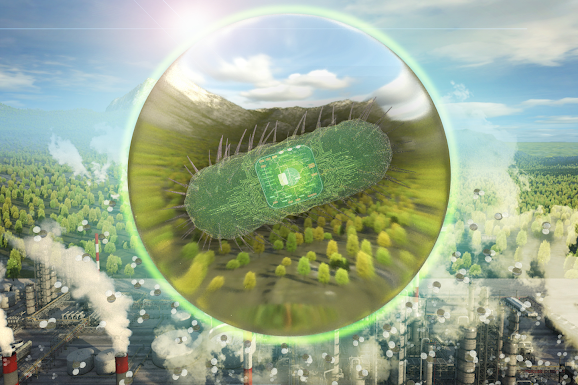Scientists use synthetic biology to address urgent sustainability challenges
Bioengineering professor Michael C. Jewett shares how Stanford researchers are working with the building blocks of biology to produce greener chemicals, more climate-resilient agriculture, and new ways to repurpose food waste.
“Synthetic biology advances our ability to engineer living systems to address some of the world’s biggest sustainability challenges, allowing us to rethink how we meet human needs on a planetary scale,” said Michael C. Jewett, professor of bioengineering in the Schools of Engineering and Medicine.
In this Q&A, Jewett explains a bit of background about this field and exciting projects already in the works to enable new solutions for planetary health.
Synthetic biology is a field that uses engineering principles to advance our ability to build with biology. Similar to how software developers write code to instruct computers, synthetic biologists write DNA to guide biological systems in performing specific tasks. What’s so cool is that, unlike computer programs, biology is not just about bits (i.e., information), it’s about bits and atoms … and you can build stuff with atoms. We can now engineer biological systems to address a wide range of needs by composing or building biological systems – from compostable materials to cellular therapies to the future of food.
In collaboration with Lanzatech, my lab learned how to engineer a bacterium called Clostridium to consume carbon dioxide and produce sustainable chemicals. (Full disclosure: I’m on the scientific advisory board of Lanzatech.) We engineer these bacteria to produce chemicals used in everything from disinfectants to jet fuels.
Event Name : International Molecular Biologist Awards
Website Link: molecularbiologist.org/
Contact Mail ID : support@molecularbiologist.org
Nomination Link : https://molecularbiologist.org/award-nomination/?ecategory=Awards&rcategory=Awardee
Follow On:
Twitterhttps://x.com/Camilla532645
Blogger https://molecularconference.blogspot.com/
Youtube https://www.youtube.com/channel/UCehrwFGWKbQa0mKDDNJCwvA
Pinterest https://in.pinterest.com/molecularbiologistawards/
Linkedin https://www.linkedin.com/feed/?trk=onboarding-landing
Instagram https://www.instagram.com/molecularawards
#SyntheticBiology #SustainableScience #GreenBiotech #BioInnovation #ClimateSolutions #FutureBiotech #EcoEngineering #BiotechForGood #SustainableFuture #GeneticSolutions #EnvironmentalBiotech #BioSustainability #CleanTech #NatureInspired #CarbonReduction #BioDesign #Biomanufacturing #ResilientEcosystems #PlanetProtection #BiotechInnovation




Comments
Post a Comment